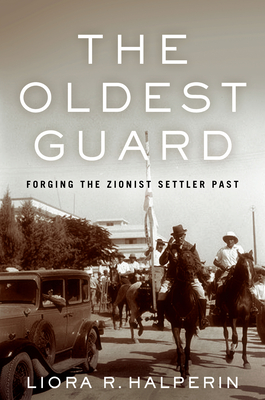The Oldest Guard: Forging the Zionist Settler Past

The Oldest Guard: Forging the Zionist Settler Past
The Oldest Guard tells the story of Zionist settler memory in and around the private Jewish agricultural colonies (moshavot) established in late nineteenth-century Ottoman Palestine. Though they grew into the backbone of lucrative citrus and wine industries of mandate Palestine and Israel, absorbed tens of thousands of Jewish immigrants, and became known as the "first wave" (First Aliyah) of Zionist settlement, these communities have been regarded--and disregarded--in the history of Zionism as sites of conservatism, lack of ideology, and resistance to Labor Zionist politics.
Treating the "First Aliyah" as a symbol created and deployed only in retrospect, Liora R. Halperin offers a richly textured portrait of commemorative practices between the 1920s and the 1960s. Drawing connections to memory practices in other settler societies, The Oldest Guard demonstrates how private agriculturalists and their advocates in the Zionist center and on the right celebrated and forged the "First Aliyah" past, revealing the centrality of settlement to Zionist collective memory and the politics of Zionist settler "firstness."
The Oldest Guard tells the story of Zionist settler memory in and around the private Jewish agricultural colonies (moshavot) established in late nineteenth-century Ottoman Palestine. Though they grew into the backbone of lucrative citrus and wine industries of mandate Palestine and Israel, absorbed tens of thousands of Jewish immigrants, and became known as the "first wave" (First Aliyah) of Zionist settlement, these communities have been regarded-and disregarded-in the history of Zionism as sites of conservatism, lack of ideology, and resistance to Labor Zionist politics.
Treating the "First Aliyah" as a symbol created and deployed only in retrospect, Liora R. Halperin offers a richly textured portrait of commemorative practices between the 1920s and the 1960s. Drawing connections to memory practices in other settler societies, The Oldest Guard demonstrates how private agriculturalists and their advocates in the Zionist center and on the right celebrated and forged the "First Aliyah" past, revealing the centrality of settlement to Zionist collective memory and the politics of Zionist settler "firstness."
PRP: 217.00 Lei
Acesta este Pretul Recomandat de Producator. Pretul de vanzare al produsului este afisat mai jos.
195.30Lei
195.30Lei
217.00 LeiIndisponibil
Descrierea produsului
The Oldest Guard tells the story of Zionist settler memory in and around the private Jewish agricultural colonies (moshavot) established in late nineteenth-century Ottoman Palestine. Though they grew into the backbone of lucrative citrus and wine industries of mandate Palestine and Israel, absorbed tens of thousands of Jewish immigrants, and became known as the "first wave" (First Aliyah) of Zionist settlement, these communities have been regarded--and disregarded--in the history of Zionism as sites of conservatism, lack of ideology, and resistance to Labor Zionist politics.
Treating the "First Aliyah" as a symbol created and deployed only in retrospect, Liora R. Halperin offers a richly textured portrait of commemorative practices between the 1920s and the 1960s. Drawing connections to memory practices in other settler societies, The Oldest Guard demonstrates how private agriculturalists and their advocates in the Zionist center and on the right celebrated and forged the "First Aliyah" past, revealing the centrality of settlement to Zionist collective memory and the politics of Zionist settler "firstness."
The Oldest Guard tells the story of Zionist settler memory in and around the private Jewish agricultural colonies (moshavot) established in late nineteenth-century Ottoman Palestine. Though they grew into the backbone of lucrative citrus and wine industries of mandate Palestine and Israel, absorbed tens of thousands of Jewish immigrants, and became known as the "first wave" (First Aliyah) of Zionist settlement, these communities have been regarded-and disregarded-in the history of Zionism as sites of conservatism, lack of ideology, and resistance to Labor Zionist politics.
Treating the "First Aliyah" as a symbol created and deployed only in retrospect, Liora R. Halperin offers a richly textured portrait of commemorative practices between the 1920s and the 1960s. Drawing connections to memory practices in other settler societies, The Oldest Guard demonstrates how private agriculturalists and their advocates in the Zionist center and on the right celebrated and forged the "First Aliyah" past, revealing the centrality of settlement to Zionist collective memory and the politics of Zionist settler "firstness."
Detaliile produsului









